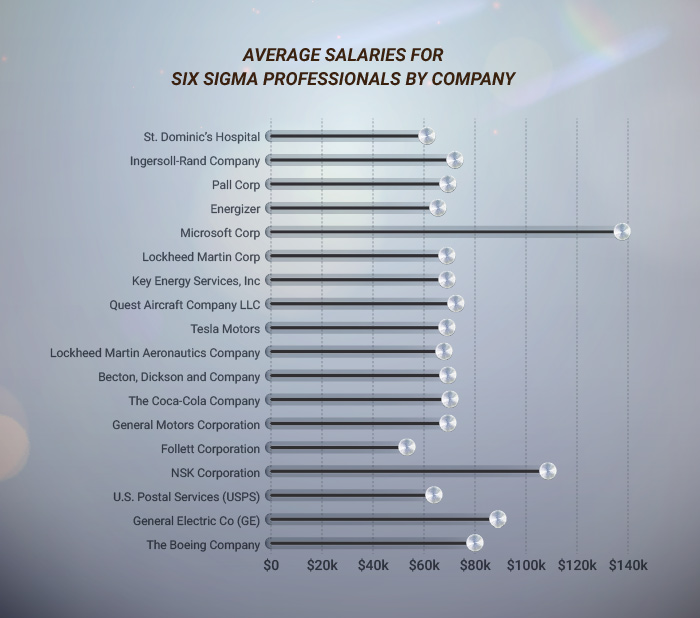As competition is increasing and the awareness of process improvement strategy is growing, it is obvious to expect that Lean and Six Sigma would become more popular than ever. With its ability to solve business problems, it is widely used in various business sectors. Thus, in this blog, we’ll discuss the Future Scope and Opportunities of Six Sigma in 2022 and show you how it is a career worth exploring in the coming future.
Six Sigma is basically a set of tools and methods for process improvement that seeks to improve the quality of manufacturing by identifying and eliminating the causes of defects and minimizing variability in manufacturing and business processes. This is done by the use of statistical and empirical quality management techniques and by hiring people who serve as Six Sigma experts. Thus, each Six Sigma project follows a specific methodology and has defined value targets, like reducing pollution or increasing the satisfaction of customers.
With wide application in large organizations, Six Sigma plays a significant role in numerous industries such as minimizing costs and reducing wastage in manufacturing companies, identifying and preventing defects and rework in engineering and construction firms, enhancing the accuracy of cash allocation so as to reduce bank charges, automatic payments, reducing documentary credit defects, check collection defects, as well as variation in collector performance in the finance sector, preserve high-quality standards and timely delivery to customers in the supply chain, and reducing the inventory of equipment that produces extra costs, changing the process of healthcare delivery so as to make it more efficient and refining reimbursements in the healthcare sector. Thus, Six Sigma has tremendous use in various industries that makes it a skill worthy of gaining. So, let’s discuss this in detail, beginning with the target audience for the profile.
Target Groups
Candidates from the following industries will highly benefit after learning Six Sigma-
- Information technology
- Finance
- Healthcare
- Sales and marketing
- Manufacturing
Skills Required
In order to become proficient in using Six Sigma, it is advised for you to possess the following skills-
- Business knowledge
- Communication skills
- Management skills
- Technical knowledge
- Leadership qualities
Learning Outcomes
Learning Six Sigma has the following benefits-
- Helps in predicting, preventing and controlling defects in a process.
- Provides understanding of the elements of waste.
- Helps achieve sustainable quality improvement via process improvement.
- Provides skills to reduce variation in processes.
- Enhances the ability to identify, analyse, and measure process potential.
- Helps you learn the usage of inferential statistics and hypothesis testing.
Roles and Responsibilities
As a Six Sigma practitioner, you’ll be expected to fulfill the following roles and responsibilities-
- Scope the projects
- Lead the project team
- Call for help when required
- Manage interfaces with business leaders
- Ensure sustainable results
- Translate the value of Six Sigma to the particular work environment and issues
Career Prospects
With expertise in Six Sigma, you’ll be able to explore the following highly-paid job profiles-
Business Process Analysts
A business process analyst helps senior management to drive the strategy execution through designing new business models; streamlining and reengineering existing business processes and providing support to change management.
Average salary- Rs.7,00,000
Supply Chain Managers
As a supply chain manager, you’ll oversee and manage every stage of the production flow, from purchasing the raw materials to the delivery of the final product. You’ll ensure the right amount of product is made at the right time, as well as coordinate the storage of the product.
Average salary-Rs.12,81,605
Project Managers
Project managers are the professionals who organize, plan and execute projects while keeping in mind the budgets and schedules. They are in charge of leading teams, defining the objectives of the team, communicating with the stakeholders, and overseeing a project through to its closure.
Average salary-Rs.4,71,000
Warehouse Managers
Warehouse managers are the ones who supervise all activities of the facility, involving overseeing the team performance, expediting the shipping and receiving of goods, and ensuring the organized and efficient storage of goods. Candidates with technical expertise are well suited for this job role.
Average salary-Rs.5,00,730
Quality Managers
Quality managers are the professionals in charge of supervising the production process in order to ensure that all the products are meeting consistent standards. They develop and implement quality control tests, inspect products at different stages and write reports for documenting production issues.
Average salary-Rs.9,02,015
Operations Managers
Operations managers generally oversee the business activities related to organizations, non-profit groups, government agencies, and other different organizations. These managers hire, supervise, and train employees, manage the quality assurance programs, and strategize process enhancements, at both large and small organizations.
Average salary-Rs.9,00,000
Certification Types
Six Sigma certification training has been divided into the following five types-
Six Sigma White Belt
This course provides you with the basic comprehension of the Lean Six Sigma outline by giving you brief information about the roles played by the team members.
Six Sigma Yellow Belt
This course teaches you the fundamental methodologies by covering a few of the underlying improvement procedures and important metrics.
Six Sigma Green Belt
This course help you learn the way to create charts, process map and control a plan so as to guide other employees to describe the Six Sigma roles within a company.
Six Sigma Black Belt
This course helps you perform multiple regression, factorial experiments, and explain the different types of process optimization.
Master Black Belt
This course is the highest Six Sigma certification program that provides you with an advanced and highly focused approach Six Sigma project as well as statistical methods.
So, if you are someone, who wishes to get certified in any of the above Six Sigma programs, then the following tutorial would help you understand all that you need to know about Six Sigma certification and ideal ways to prepare for it. Moreover, you can try out the practice tests simultaneously in order to test your level of preparation.






